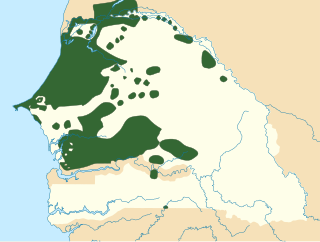Related Research Articles
A pidgin, or pidgin language, is a grammatically simplified means of communication that develops between two or more groups of people that do not have a language in common: typically, its vocabulary and grammar are limited and often drawn from several languages. It is most commonly employed in situations such as trade, or where both groups speak languages different from the language of the country in which they reside.

A creole language, or simply creole, is a stable natural language that develops from the process of different languages simplifying and mixing into a new form, and then that form expanding and elaborating into a full-fledged language with native speakers, all within a fairly brief period. While the concept is similar to that of a mixed or hybrid language, creoles are often characterized by a tendency to systematize their inherited grammar. Like any language, creoles are characterized by a consistent system of grammar, possess large stable vocabularies, and are acquired by children as their native language. These three features distinguish a creole language from a pidgin. Creolistics, or creology, is the study of creole languages and, as such, is a subfield of linguistics. Someone who engages in this study is called a creolist.

Wolof is a Niger–Congo language spoken by the Wolof people in much of West African subregion of Senegambia that is split between the countries of Senegal, Mauritania, and the Gambia. Like the neighbouring languages Serer and Fula, it belongs to the Senegambian branch of the Niger–Congo language family. Unlike most other languages of its family, Wolof is not a tonal language.
Hawaiian Pidgin is an English-based creole language spoken in Hawaiʻi. An estimated 600,000 residents of Hawaiʻi speak Hawaiian Pidgin natively and 400,000 speak it as a second language. Although English and Hawaiian are the two official languages of the state of Hawaiʻi, Hawaiian Pidgin is spoken by many residents of Hawaiʻi in everyday conversation and is often used in advertising targeted toward locals in Hawaiʻi. In the Hawaiian language, it is called ʻōlelo paʻi ʻai – "hard taro language". Hawaiian Pidgin was first recognized as a language by the U.S. Census Bureau in 2015. However, Hawaiian Pidgin is still thought of as lower status than the Hawaiian and English languages.
Nigerian Pidgin, also known as Naija or Naijá in scholarship, is an English-based creole language spoken as a lingua franca across Nigeria. The language is sometimes referred to as Pijin, Brokun 'Ullu' or "Vernacular". It can be spoken as a pidgin, a creole, dialect or a decreolised acrolect by different speakers, who may switch between these forms depending on the social setting. In the 2010s, a common orthography was developed for Pidgin which has been gaining significant popularity in giving the language a harmonized writing system.

The Sierra Leonean Creole or Krio is an English-based creole language that is lingua franca and de facto national language spoken throughout the West African nation of Sierra Leone. Krio is spoken by 96 percent of the country's population, and it unites the different ethnic groups in the country, especially in their trade and social interaction with each other. Krio is the primary language of communication among Sierra Leoneans at home and abroad, and has also heavily influenced Sierra Leonean English. The language is native to the Sierra Leone Creole people, or Krios, a community of about 104,311 descendants of freed slaves from the West Indies, Canada, United States and the British Empire, and is spoken as a second language by millions of other Sierra Leoneans belonging to the country's indigenous tribes. Krio, along with English, is the official language of Sierra Leone.
In linguistics, relexification is a mechanism of language change by which one language changes much or all of its lexicon, including basic vocabulary, with the lexicon of another language, without drastically changing the relexified language's grammar. The term is principally used to describe pidgins, creoles, and mixed languages.

Belizean Creole is an English-based creole language spoken by the Belizean Creole people. It is closely related to Miskito Coastal Creole, San Andrés-Providencia Creole, and Jamaican Patois.

Juba Arabic, also known since 2011 as South Sudanese Arabic, is a lingua franca spoken mainly in Equatoria Province in South Sudan, and derives its name from the South Sudanese capital, Juba. It is also spoken among communities of people from South Sudan living in towns in Sudan. The pidgin developed in the 19th century, among descendants of Sudanese soldiers, many of whom were recruited from southern Sudan. Residents of other large towns in South Sudan, notably Malakal and Wau, do not generally speak Juba Arabic, tending towards the use of Arabic closer to Sudanese Arabic, in addition to local languages. Reportedly, it is the most spoken language in South Sudan despite government attempts to discourage its use due to its association with past Arab rule.

Guinea-Bissau Creole, also known as Kiriol or Crioulo, is a creole language whose lexicon derives mostly from Portuguese. It is spoken in Guinea Bissau, Senegal and The Gambia. It is also called by its native speakers as guinensi, kriyol, or portuguis.
Bidau Creole Portuguese, also known as Timor Pidgin was a Portuguese-based creole language that was spoken in Bidau, Nain Feto, an eastern suburb of Dili, East Timor.
An Arabic-based creole language, or simply Arabic creole is a creole language which was significantly influenced by the Arabic language.
An English-based creole language is a creole language for which English was the lexifier, meaning that at the time of its formation the vocabulary of English served as the basis for the majority of the creole's lexicon. Most English creoles were formed in British colonies, following the great expansion of British naval military power and trade in the 17th, 18th and 19th centuries. The main categories of English-based creoles are Atlantic and Pacific.

A French creole, or French-based creole language, is a creole for which French is the lexifier. Most often this lexifier is not modern French but rather a 17th- or 18th-century koiné of French from Paris, the French Atlantic harbors, and the nascent French colonies. This article also contains information on French pidgin languages, contact languages that lack native speakers.
Creole may refer to:
West African Pidgin English, also known as Guinea Coast Creole English, is a West African pidgin language lexified by English and local African languages. It originated as a language of commerce between British and African slave traders during the period of the transatlantic slave trade. As of 2017, about 75 million people in Nigeria, Cameroon, Ghana and Equatorial Guinea used the language.

Senegal is a multilingual country: Ethnologue lists 36 languages, Wolof being the most widely spoken language.

Petit nègre, also known as Français tirailleur or Petinègue or Forofifon naspa, is a pidgin language that was spoken by West African soldiers and their white officers in the French colonial army and across certain French colonies approximately from 1857 to 1954. It consists of a simplified form of French. It never creolized, and the "simplified" language was taught to indigenous inhabitants in the French colonial army in the French colonies.
Japanese-based creole languages or simply Japanese Creoles are creole languages for which Japanese is the lexifier. This article also contains information on Japanese pidgin languages, contact languages that lack native speakers.
References
- ↑ Norval Smith (1994). "26. An annotated list of creoles, pidgins, and mixed languages". Pidgins and Creoles: an introduction. p. 358. doi:10.1075/CLL.15.34SMI. ISBN 978-90-272-9950-5. Wikidata Q126924151.
{{cite book}}:|journal=ignored (help)